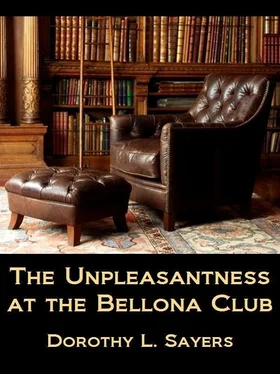“That’s all nothing,” she said, “I don’t do any of that muck now. It was just a passing craze. I paint, really. What do you think of this?” She indicated the unpleasant landscape.
Parker said it was very good.
“Are these your work, too?” he asked indicating the other canvases.
“Yes,” she said.
He turned a few of them to the light noticing at the same time how dusty they were. Nellie had scamped this bit of the work — or perhaps had been told not to touch. Miss Dorland showed a trifle more animation than she had done hitherto, while displaying her works. Landscape seemed to be rather a new departure; most of the canvases were figure-studies.
Mr. Parker thought that, on the whole, the artist had done wisely to turn to landscape. He was not well acquainted with the modern school of thought in painting, and had difficulty in expressing his opinion of these curious figures, with their faces like eggs and their limbs like rubber.
“That is the Judgment of Paris,” said Miss Dorland.
“Oh, yes,” said Parker. “And this?”
“Oh, just a study of a woman dressing, It’s not very good. I think this portrait of Mrs. Mitcham is rather decent, though.”
Parker stared aghast; it might possibly be a symbolic representation of Mrs. Mitcham’s character, for it was very hard and spiky; but it looked more like a Dutch doll, with its triangular nose, like a sharp-edged block of wood, and its eyes mere dots in an expanse of liver-coloured cheek.
“It’s not very like her,” he said, doubtfully.
“It’s not meant to be.”
“This seems better — I mean, I like this better,” said Parker, turning the next picture up hurriedly.
“Oh, that’s nothing — just a fancy head.”
Evidently this picture — the head of a rather cadaverous man, with a sinister smile and a slight cast in the eye — was despised — a Philistine backsliding, almost like a human being. It was put away, and Parker tried to concentrate his attention on a “Madonna and Child” which, to Parker’s simple evangelical mind, seemed an abominable blasphemy.
Happily, Miss Dorland soon wearied, even of her paintings, and flung them all back into the corner.
“D’you want anything else?” she demanded abruptly. “Here’s that address.”
Parker took it.
“Just one more question,” he said looking her hard in the eyes. “Before Lady Dormer died — before General Fentiman came to see her — did you know what provision she had made for you and for him in her will?”
The girl stared back at him, and he saw panic come into her eyes. It seemed to flow all over her like a wave. She clenched her hands at her sides, and her miserable eyes dropped beneath his gaze, shifting as though looking for a way out.
“Well?” said Parker.
“No!” she said. “No! of course not. Why should I?” Then, surprisingly, a dull crimson flush flooded her sallow cheeks and ebbed away, leaving her looking like death.
“Go away,” she said, furiously, “you make me sick.”
Chapter XVIII
Picture-Cards
“So I’ve put a man in and had all the things in that cupboard taken away for examination,” said Parker.
Lord Peter shook his head.
“I wish I had been there,” he said, “I should have liked to see those paintings. However—”
“They might have conveyed something to you,” said Parker, “you’re artistic. You can come along and look at them any time, of course. But it’s the time factor that’s worrying me, you know. Supposing she gave the old boy digitalin in his B and S, why should it wait all that time before working? According to the books, it ought to have popped him off in about an hour’s time. It was a biggish dose, according to Lubbock.”
“I know. I think you’re up against a snag there. That’s why I should have liked to see the pictures.”
Parker considered this apparent non sequitur for a few moments and gave it up.
“George Fentiman—” he began.
“Yes,” said Wimsey, “George Fentiman. I must be getting emotional in my old age, Charles, for I have an unconquerable dislike to examining the question of George Fentiman’s opportunities.”
“Bar Robert,” pursued Parker, ruthlessly, “he was the last interested person to see General Fentiman.”
“Yes — by the way, we have only Robert’s unsupported word for what happened in that last interview between him and the old man.”
“Come, Wimsey — you’re not going to pretend that Robert had any interest in his grandfather’s dying before Lady Dormer. On the contrary.”
“No — but he might have had some interest in his dying before he made a will. Those notes on that bit of paper. The larger share was to go to George. That doesn’t entirely agree with what Robert said. And if there was no will, Robert stood to get everything.”
“So he did. But by killing the General then, he made sure of getting nothing at all.”
“That’s the awkwardness. Unless he thought Lady Dormer was already dead. But I don’t see how he could have thought that. Or unless—”
“Well?”
“Unless he gave his grandfather a pill or something to be taken at some future time, and the old boy took it too soon by mistake.”
“That idea of a delayed-action pill is the most tiresome thing about this case. It makes almost anything possible.”
“Including, of course, the theory of its being given to him by Miss Dorland.”
“That’s what I’m going to interview the nurse about, the minute I can get hold of her. But we’ve got away from George.”
“You’re right. Let’s face George. I don’t want to, though. Like the lady in Maeterlinck who’s running round the table while her husband tries to polish her off with a hatchet, I am not gay. George is the nearest in point of time. In fact he fits very well in point of time. He parted from General Fentiman at about half-past six, and Robert found Fentiman dead at about eight o’clock. So allowing the stuff was given in a pill—”
“Which it would have to be, in a taxi,” interjected Parker.
“As you say — in a pill, which would take a bit longer to get working than the same stuff taken in solution — why then the General might quite well have been able to get to the Bellona and see Robert before collapsing.”
“Very nice. But how did George get the drug?”—
“I know, that’s the first difficulty.”
“And how did he happen to have it on him just at that time? He couldn’t possibly have known that General Fentiman would run across him just at that moment. Even if he’d known of his being at Lady Dormer’s, he couldn’t be expecting him to go from there to Harley Street.”
“He might have been carrying the stuff about with him, waiting for a good opportunity to use it. And when the old man called him up and started jawing him about his conduct and all that, he thought he’d better do the job quick, before he was cut out of the will.”
“Um! — but why should George be such a fool, then, as to admit he’d never heard about Lady Dormer’s will? If he had heard of it, we couldn’t possibly suspect him. He’d only to say the General told him about it in the taxi.”
“I suppose it hadn’t struck him in that light.”
“Then George is a bigger ass than I took him for.”
“Possibly he is,” said Parker, dryly. “At any rate, I have put a man on to make inquiries at his home.”
“Oh! have you? I say, do you know, I wish I’d left this case alone. What the deuce did it matter if old Fentiman was pushed painlessly off a bit before his time? He was simply indecently ancient.”
“We’ll see if you say that in sixty years’ time,” said Parker.
Читать дальше












